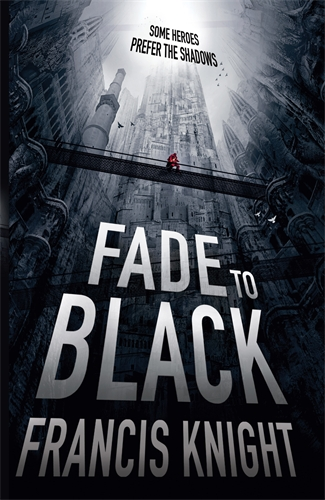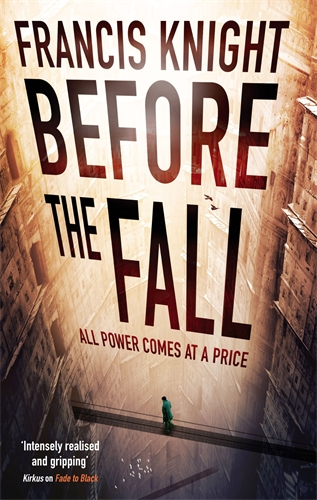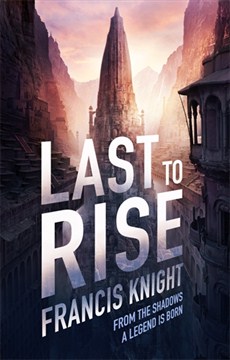Introducing Guns into Fantasy Worlds
 Francis Knight’s novel FADE TO BLACK (UK|US|ANZ) and the just released BEFORE THE FALL (UK|US|ANZ) are set in Mahala – a towering, vertically-built fantasy city. It’s a place that has long relied on magic, but is fast becoming mechanised – and now the first prototype guns are appearing. Francis Knight discusses below just what the introduction of arms can do to a world – fantasy or otherwise . . .
Francis Knight’s novel FADE TO BLACK (UK|US|ANZ) and the just released BEFORE THE FALL (UK|US|ANZ) are set in Mahala – a towering, vertically-built fantasy city. It’s a place that has long relied on magic, but is fast becoming mechanised – and now the first prototype guns are appearing. Francis Knight discusses below just what the introduction of arms can do to a world – fantasy or otherwise . . .
Whenever a significant discovery or invention appears, everything changes. Not always in foreseen ways either. I don’t suppose Edison or Babbage ever thought that their discoveries/inventions would mean that you’d be here today, reading this on a PC or pad. Did Edison consider that electricity would be used to carry out death sentences? Would Babbage have continued if he’d known the end result would be Rule 34?
Unforeseen consequences abound in history. If I invent this, it will make life easier for everyone! Only then, a war, or a revolution or plague, people being people, or even just a lack of imagination on the part of the inventor means that it all turns out rather differently.
The same thing goes for guns. Yes, many fantasy worlds use just swords/siege engines/whatever. But what happens to warfare when guns are added to the mix? Are they what people expect? Possibly not. The inventor of the Gatling gun noted that more died in war of infection and disease than gunfire. In 1877, Gatling wrote: “It occurred to me that if I could invent a machine – a gun – which could by its rapidity of fire, enable one man to do as much battle duty as a hundred, that it would, to a large extent supersede the necessity of large armies, and consequently, exposure to battle and disease would be greatly diminished.” And of course, that worked wonderfully.
What actually happens, of course, when some new weapon is invented and comes into use is this: power shifts. And the people who had the power get annoyed and scared and do stupid, scared things and the people who now have the power get a bit trigger happy and . . . and yes, things don’t go to plan. Because people don’t go to plan. So you maybe get a new power base (or the old one gets the weapons quick and denies them to everyone else, or someone steals the new weapon or . . . ), you invent a cannon, and someone else invents a castle that won’t succumb, or a bigger cannon. But the people, they stay the same. Always there is someone willing to kill, and they’ll take any method that comes to hand. People will try to defend themselves any way they can. Other people will take any power shifter and use it to their advantage, and still other people react to that by taking up that weapon, or one more powerful . . . and it’s not long before it’s two minutes to midnight and everyone is pooping their pants.
In real life, of course, this is all way way more complicated by other things. But in a book, well, you can take a standard world, and add just one thing – say, someone invents a gun – and then extrapolate and extrapolate and see what might happen. For me, one of the things that will probably happen is this: Once you take away the fact that you have to get up close and personal to kill someone, you take away the fear and disgust of killing. It becomes, if not easy, then easier. Mechanised. Or perhaps an arms race starts – that would be realistic. Maybe some are afraid, and that’s probably the people without guns. But what if they get hold of them? Who needs to be afraid then? Frankly, it could go any way, depending on the people involved, because guns are predictable. People aren’t always, except for perhaps ‘Someone will do something stupid’.
 What about the difference between two societies and their attitude to guns? The Brits and their ‘Eek! A gun!’ attitude, but low gun crime v the US, their right to own a gun and use it, and a huge gun problem? Then there’s the Swiss, with a high gun ownership level, and low gun crime rate. It’s not as simple as ‘more guns equals more people shot’, though fewer guns is obviously going to help with that.
What about the difference between two societies and their attitude to guns? The Brits and their ‘Eek! A gun!’ attitude, but low gun crime v the US, their right to own a gun and use it, and a huge gun problem? Then there’s the Swiss, with a high gun ownership level, and low gun crime rate. It’s not as simple as ‘more guns equals more people shot’, though fewer guns is obviously going to help with that.
So, when I introduced guns into the city of Mahala, all these things came into play, and I had to ask myself a lot of questions. What sort of society is it? How are they divided? Who’s going to have the guns – and who’s going to want them? Is everyone going to be sensible? Or not? The sort of questions you have to ask yourself about every aspect of your world-building.
Because, for me, people play more part in gun crime, or how society sees guns, the changes the introduction of them make, as the presence of guns do. And the fun of fantasy is working out how X affects Y in your world – how would this society, these people react to the introduction of guns? It’ll be different for every different society you invent – or should be.
***
FADE TO BLACK (UK | US | ANZ) and BEFORE THE FALL (UK | US | ANZ), books one and two of the Rojan Dizon novels, are out now. The third and final novel, LAST TO RISE, releases in November 2013.



